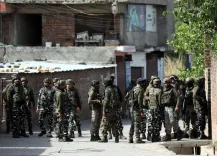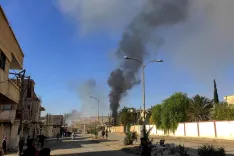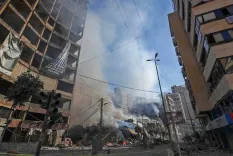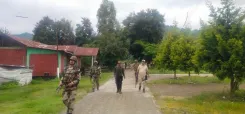What Steps is the Syrian Interim Leader Taking for Unity Amid Ceasefire?
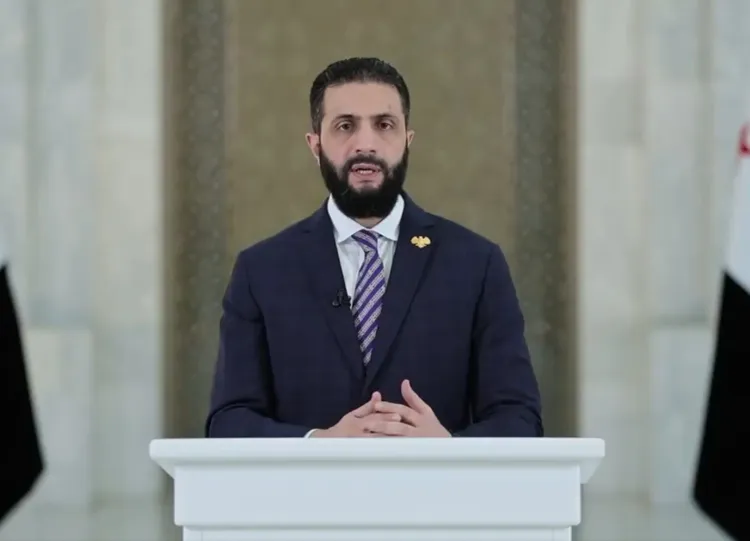
Synopsis
Key Takeaways
- Al-Sharaa emphasizes the importance of national unity.
- Retaliatory attacks and Israeli airstrikes are seen as key threats.
- The US-brokered ceasefire represents a hopeful development.
- The safety of civilians is a priority in the current truce.
- Restoration of state control and law is crucial for stability.
Damascus, July 19 (NationPress) Syrian interim leader Ahmad al-Sharaa on Saturday pointed fingers at retaliatory assaults by 'outlawed' armed factions in the Sweida province and Israeli airstrikes for leading the nation into a precarious situation, urging for national unity and reconciliation in the war-stricken nation.
In a televised address, al-Sharaa mentioned that the exit of state forces from certain parts of the southern Sweida province resulted in a security vacuum, enabling local armed Druze factions to execute revenge attacks against Bedouin groups. These actions, he stated, were accompanied by severe human rights violations and spurred other tribal factions to rally in defense of their endangered relatives, as reported by the Xinhua news agency.
He held Israel accountable for rekindling tensions with blatant airstrikes in southern Syria and on government sites in Damascus, cautioning that such actions had pushed the country into a dangerous stage threatening its stability.
Furthermore, al-Sharaa expressed discontent with the 'narrow interests' of certain individuals in Sweida and condemned the exploitation of the province by both internal and external forces as a battleground for regional conflicts. 'This only exacerbates the crisis and fails to benefit the interests of Syrians,' he stated.
In the broader political landscape, the Syrian leader commended the recent US-brokered ceasefire agreement between Syria and Israel, announced early Saturday, describing it as a 'crucial step toward ceasing the bloodshed.' He expressed gratitude for Washington's support and acknowledged the contributions of Arab nations and Turkey in facilitating the truce.
On Saturday, Syrian authorities declared an immediate and comprehensive nationwide ceasefire.
In a statement released Saturday morning, Syrian officials noted that the truce aimed to uphold national unity and ensure civilian safety amidst 'critical circumstances,' labeling the initiative as a national and humanitarian duty.
The authorities urged all factions to halt hostilities and guarantee the secure delivery of humanitarian aid.
They pledged to restore state control over the Sweida province, assist in the return of displaced civilians, and re-establish law and order, warning that any breach of the ceasefire would be regarded as a violation of national sovereignty, subject to legal repercussions.
This announcement followed closely behind US Special Envoy for Syria Tom Barrack's disclosure of the truce on X, stating that Israeli Prime Minister Benjamin Netanyahu and Syrian interim leader Ahmad al-Sharaa had consented to a cessation of hostilities, facilitated by US Secretary of State Marco Rubio.
The agreement also enjoys the backing of regional entities, including Turkey, Jordan, and Syria's neighboring countries.
The ceasefire arrangement followed six days of intense sectarian clashes in Sweida, which resulted in hundreds of casualties and raised alarms over a potential wider regional escalation.
During his televised address, al-Sharaa reaffirmed the government's commitment to safeguarding all minorities and pursuing all offenders, irrespective of their affiliations. 'We renounce all crimes and violations committed, whether from within or outside Sweida,' he added.
Al-Sharaa concluded by stressing Syria's unity and sovereignty: 'Syria is not a testing ground for partition projects, secession, or sectarian incitement. It is time we return to a national foundation capable of building a stable future.'

